The past perfect in French is used to express an action that occurred before another action in the past. It is often formed using the auxiliary verb "avoir" or "être" conjugated in the imperfect tense, followed by the past participle of the main verb.
How to Form the Pluperfect - Le plus-que-parfait:
To form the past perfect - Le plus-que parfait, we use:
1- The verb "être" or "avoir" in the imperfect tense (l'imparfait) as an auxiliary verb.
2- In addition to that, we add the past participle (le participe passé) of the main verb.
|
imparfait de ÊTRE + participe passé |
|
imparfait de Avoir + participe passé |
Conjugation of the verb "être" in the imperfect tense:
|
être à l’imparfait |
|
| je | étais |
| tu | étais |
| il / elle | était |
| nous | étions |
| vous | étiez |
| ils / elles | étaient |
Note: The past participle (le participe passé) agrees with the subject (le sujet) in gender and number, whether masculine or feminine, and singular or plural.
Conjugation of the verb venir (come) with "être":
|
être à l’imparfait |
le participe passé |
|
| je | étais | venu |
| tu | étais | venu |
| il / elle | était | venu / venue |
| nous | étions | venus |
| vous | étiez | venus |
| ils / elles | étaient | venus / venues |
Conjugation of the verb "avoir" in the imperfect tense:
|
avoir à l’imparfait |
|
| je | avais |
| tu | avais |
| il / elle | avait |
| nous | avions |
| vous | aviez |
| ils / elles | avaient |
Conjugation of the verb dire (say) with "avoir":
|
avoir à l’imparfait |
le participe passé |
|
| je | avais | dit |
| tu | avais | dit |
| il / elle | avait | dit |
| nous | avions | dit |
| vous | aviez | dit |
| ils / elles | avaient | dit |
When to use the past perfect - Le plus-que parfait:
1- To indicate that an action has ended:
Example:
L'examen avait fini le 20 mars.
The exam had finished on March 20.
2- To indicate an action that occurred before another action in the past:
Examples:
| Quand il est arrivé, j’avais fini mon travail. | When he arrived, I had finished my work. |
| J'avais mangé avant qu'il n'arrive. | I had eaten before he arrived. |
In this example, "avais mangé" is the past perfect construction, indicating that the action of eating occurred before the arrival (arrive) mentioned in the sentence.
3-To express a hypothesis in the past:
Example:
Si tu avais été chez toi, je serais passé te voir.
If you had been at home, I would have come to see you.
4- To express regret:
Example:
Si j'avais pu rester plus avec vous.
If I could have stayed longer with you.
5-To express reproach:
Example:
Si elle m'avait attendu.
If she had waited for me.
If you have any more specific questions or if there's a particular aspect you'd like more information on, feel free to ask!





